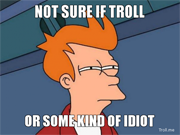Porn Piracy Cash Threats to Hit Virgin Media Customers
vendredi 24 octobre 2014 à 11:00 It’s been more than seven years since so-called copyright trolls first tried their luck with the British public. UK lawfirm Davenport Lyons, a company that attempted to mislead future targets with a semi-bogus high-profile damages ‘ruling’, went into administration early 2014 but not before its partners were disciplined for targeting innocent people.
It’s been more than seven years since so-called copyright trolls first tried their luck with the British public. UK lawfirm Davenport Lyons, a company that attempted to mislead future targets with a semi-bogus high-profile damages ‘ruling’, went into administration early 2014 but not before its partners were disciplined for targeting innocent people.
The follow-up debacle involving ACS:Law was widely documented, with owner Andrew Crossley being forced to close down his business after being suspended by the Solicitors’ Regulatory Authority for misconduct. After misleading the courts, bankruptcy was just the icing on the cake.
None of this was a deterrent to porn outfit GoldenEye International. They embarked on a similar scheme, sending letters to alleged file-sharers and demanding hundreds of pounds in settlements to make supposed lawsuits go away. However, GoldenEye learned from its predecessors by proceeding with caution and staying largely under the radar. But quite predictably and despite legal bluster and empty threats, the company took not a single case to court.
So today, quite possibly due to the tendency of the public to pay up rather than become linked with embarrassing porn movie titles, the porn trolls are back once again in the UK.
TorrentFreak has learned that last year four porn producers teamed up in an effort to force ISP Virgin Media to hand over the names and addresses of more than 1,500 subscribers said to have downloaded and shared adult content without permission.
The companies, none of which appear to be based in the UK, teamed up with Wagner & Co, the London lawfirm also working with GoldenEye. They are Mircom International Content Management & Consulting Ltd, Sunlust Pictures, Combat Zone Corporation and Pink Bonnet, Consultores de Imagem LDA.
Mircom International Content Management & Consulting Ltd are active in Europe, particularly when it comes to demanding cash settlements from alleged file-sharers in Germany. Sunlust Pictures is an adult movie company founded in 2009 by former porn actress Sunny Leone, who – entirely unsurprisingly – has featured in copyright trolling cases in the United States. Combat Zone Corporation is an adult movie company based in California. They’re no strangers to the cash settlement model either.
TorrentFreak contacted Mark Wagner at Wagner & Co to find out what his clients hope to achieve in the UK, but unfortunately our emails went unanswered. The company doesn’t appear to have a working website and its address relates to a house in residential area.
Fortunately, Virgin Media were rather more accommodating. In the past the ISP has been criticized for not doing more to protect its subscribers’ personal details but it turns out the battle with Wagner & Co has been going on for some time.
“We have contested the validity of Wagner & Co’s claims (ongoing for 12 months), asking the Judge to thoroughly review the application and the supporting evidence. We have challenged the reliability of the software used to obtain evidence of infringement (FileWatchBT) and the accuracy of the data collected,” spokesperson Emma Hutchinson told TF.
But despite Virgin Media’s efforts the High Court took the decision to side with Wagner & Co and order the ISP to hand over the details of its subscribers. While the situation is pretty grim, things could have been worse.
“The original request was for double the number of addresses than we have been forced to disclose, now fewer than 800,” Virgin explain.
“We advise any of our customers who receive a speculative letter from Wagner & Co, who also represented Golden Eye International in action against O2 customers last year, to seek independent advice from organizations such as Citizens Advice,” the ISP concludes.
Restrictions placed on GoldenEye in previous procedures indicate that initial letters sent to Virgin customers by Wagner & Co and its clients will not be as aggressive as the ones sent out by ACS:Law and will not contain a precise settlement amount. However, it is guaranteed that cash will be requested at some point.
Upon receipt of these “speculative invoices” there will be those who panic and pay up, and that’s their prerogative. But it’s highly likely that those who admit nothing and stand firm will pay what they’ve always paid in UK cases – absolutely nothing.
Source: TorrentFreak, for the latest info on copyright, file-sharing and anonymous VPN services.








 In a relatively short space of time City of London Police’s Intellectual Property Crime Unit has stamped its mark on the online piracy space in a way few other organizations have managed.
In a relatively short space of time City of London Police’s Intellectual Property Crime Unit has stamped its mark on the online piracy space in a way few other organizations have managed.
